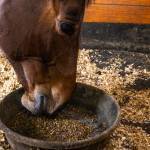Equine Osteoarthritis: Curcumin Research

Horses work hard, be it as beasts of burden or as partners in an array of athletic endeavors from trail riding to racing and eventing. With every step they take, their joints take an equal number. Over time, that wear and tear adds up, frequently cumulating in osteoarthritis. With no cure, could curcumin—a natural, polyphenolic compound derived from the popular spice turmeric—be a saving grace?
“Osteoarthritis is a degenerative and inflammatory condition of joints that results in the loss of articular cartilage that cushions the ends of long bones, permitting smooth and frictionless movement,” explained Kathleen Crandell, Ph.D., Kentucky Equine Research nutritionist.
The standard of care in the treatment of horses with osteoarthritis is a multimodal approach including:
- Nonsteroidal anti-inflammatory drugs (NSAIDs like phenylbutazone or “bute”);
- Physical therapy and rehabilitation;
- Regenerative therapies (platelet-rich plasma and IRAP/interleukin-1 receptor agonist protein);
- Intra-articular corticosteroids, hyaluronic acid, and polysulfated glycosaminoglycans;
- Intramuscular pentosan polysulfate; and
- Oral joint health supplements such as glucosamine, hyaluronic acid, chondroitin sulfate, avocado/soybean unsaponifiables (ASU), omega-3 fatty acids, and more.
With few other options, some veterinarians and owners are turning to natural products to find relief for their achy mounts. More widely known as a popular ingredient in curries, turmeric and its constituents have been used in traditional or folk medicine for thousands of years. It was used to manage a variety of conditions, from dispelling gas to asthma and allergies, leading one to wonder if turmeric and related products can benefit patients with osteoarthritis.
According to one recent study*, there is laboratory evidence that curcumin has potent anti-inflammatory properties. Specific to osteoarthritis, curcumin can reduce the increased production of matrix metalloproteinases—proteins responsible for breaking down cartilage, decrease the production of the pro-inflammatory molecule COX-2 (cyclo-oxygenase-2), and minimize the death of cartilage cells.
“More research is certainly necessary, but there is sufficient evidence published so far to suggest that natural products such as curcumin may offer some relief to horses with osteoarthritis or other inflammatory conditions,” concluded Crandell. “Different sources of curcumin and the amount of tumeric required to supply an effective dose are worthwhile research considerations.”
In the meantime, it is best for horse owners to choose joint-care products from reputable companies, such as Kentucky Equine Research (KER). Synovate HA delivers high molecular weight sodium hyaluronate and helps prevent the loss of hyaluronic acid in joints. KER•Flex contains high-quality joint support compounds glucosamine hydrochloride and chondroitin sulfate in a palatable powedered formula to provide broad-spectrum joint support. Synovate and KER•Flex are available in the U.S. and other markets. In Australia, horse owners should look to Glucos-A-Flex, a blend of glucosamine hydrochloride, vitamins, minerals, and amino acids, for joint support.
*Clutterbuck, A.L., A. Mobasheri, M. Shakibaei, et al. 2009. Interleukin-1β-induced extracellular matrix degradation and glycosaminoglycan release is inhibited by curcumin in an explant model of cartilage inflammation. Natural Compounds and Their Role in Apoptotic Cell Signaling Pathways. 1171:428-435.








